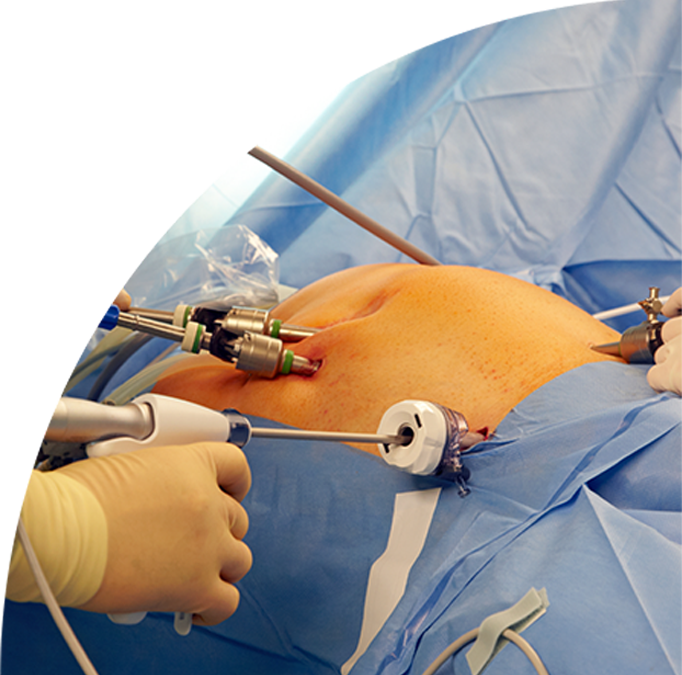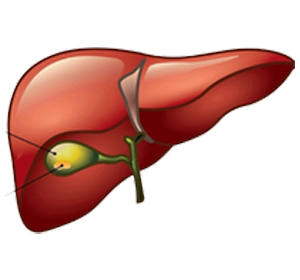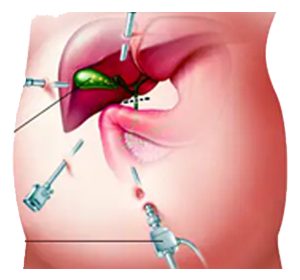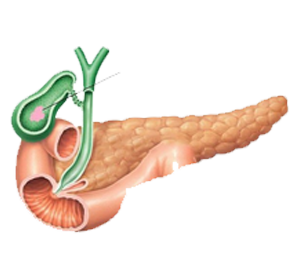Know More about Laparoscopic and General Surgery
Laparoscopic surgery, also known as keyhole surgery, is a minimally invasive surgical technique that involves small incisions and the use of a tiny camera and specialized surgical instruments. It is commonly used for procedures such as gallbladder removal, hernia repair, and appendectomy.
How Is a Laparoscopic surgery carried out?

Top Surgeries
- Symptomatic gallstones
- Gallbladder cancer
- Swelling or infected gallbladder (cholecystitis)
- Large gallbladder polyps





 During a laparoscopic appendectomy, the patient is placed under general anesthesia and small incisions are made in the abdomen. A laparoscope, a thin, lighted instrument, is then inserted through one of the incisions, which allows the surgeon to see the appendix on a monitor. Other surgical instruments are inserted through the other incisions, which are used to remove the appendix.
The benefits of laparoscopic appendectomy include smaller incisions, less pain, and a quicker recovery time compared to traditional open surgery. Patients can typically return to normal activities within a few days to a week after the procedure. The risk of complications, such as infections, bleeding, and injury to surrounding organs, is also lower with laparoscopic appendectomy compared to traditional open surgery.
Laparoscopic appendectomy is a safe and effective surgical procedure that is recommended for most patients with acute appendicitis. However, in some cases, open surgery may be necessary if there is a risk of complications, such as if the appendix has ruptured or if the patient is obese or pregnant. Your surgeon will help you determine which approach is best for your individual needs.
Dr. Anand Kumar is an expert in Laparoscopic appendix removal with 30 years of experience and a track record of successful surgeries, providing safe and effective treatment options for his patients. To know more about the procedure, Get in touch with our expert.
During a laparoscopic appendectomy, the patient is placed under general anesthesia and small incisions are made in the abdomen. A laparoscope, a thin, lighted instrument, is then inserted through one of the incisions, which allows the surgeon to see the appendix on a monitor. Other surgical instruments are inserted through the other incisions, which are used to remove the appendix.
The benefits of laparoscopic appendectomy include smaller incisions, less pain, and a quicker recovery time compared to traditional open surgery. Patients can typically return to normal activities within a few days to a week after the procedure. The risk of complications, such as infections, bleeding, and injury to surrounding organs, is also lower with laparoscopic appendectomy compared to traditional open surgery.
Laparoscopic appendectomy is a safe and effective surgical procedure that is recommended for most patients with acute appendicitis. However, in some cases, open surgery may be necessary if there is a risk of complications, such as if the appendix has ruptured or if the patient is obese or pregnant. Your surgeon will help you determine which approach is best for your individual needs.
Dr. Anand Kumar is an expert in Laparoscopic appendix removal with 30 years of experience and a track record of successful surgeries, providing safe and effective treatment options for his patients. To know more about the procedure, Get in touch with our expert.
- Total thyroidectomy
- Partial thyroidectomy
- Thyroid lobectomy
- Subtotal thyroidectomy


 Thyroid surgery is typically performed under general anesthesia, and the recovery time varies depending on the type of surgery performed. After the surgery, patients may experience temporary hoarseness or difficulty swallowing, which usually resolves within a few weeks.
Dr. Anand is a highly experienced surgeon specialized in Thyroid Surgery, providing exceptional services with a focus on patient care. Don’t neglect your thyroid health. Seek expert advise today.
Thyroid surgery is typically performed under general anesthesia, and the recovery time varies depending on the type of surgery performed. After the surgery, patients may experience temporary hoarseness or difficulty swallowing, which usually resolves within a few weeks.
Dr. Anand is a highly experienced surgeon specialized in Thyroid Surgery, providing exceptional services with a focus on patient care. Don’t neglect your thyroid health. Seek expert advise today.
Breast surgery refers to a range of surgical procedures performed to remove either benign or malignant tumors of the breast as well as alter the size, shape, or appearance of the breasts. Breast surgery can be therapeutic, cosmetic or reconstructive in nature.
Cosmetic breast surgery includes procedures such as:
Breast Augmentation (breast implants): It involves the insertion of implants to increase the size and volume of the breasts.
A Breast Lift (Mastopexy): It involves removing excess skin and reshaping the breasts to give them a more youthful appearance.
Reconstructive breast surgery is typically performed after a patient has undergone a mastectomy (breast removal) due to breast cancer. It can be done immediately after the mastectomy or at a later time. The procedure involves using a patient’s own tissue or breast implants to reconstruct the breast.
Breast surgery can help patients achieve their desired aesthetic appearance or restore their confidence after undergoing breast cancer treatment. As with any surgical procedure, there are risks and potential complications associated with breast surgery, so it is important for patients to discuss their options with a qualified surgeon to determine the best course of action.
Dr. Anand is a skilled surgeon providing safe and effective treatment options for patients with breast cancer, benign breast conditions, and aesthetic concerns, utilizing the latest techniques and technologies to achieve optimal outcomes. Talk to our specialist for best advice and treatment plan.
Abdominal surgery refers to a range of surgical procedures performed on organs located in the abdominal cavity, such as the stomach, intestines, liver, pancreas, spleen, and gallbladder. Abdominal surgery may be necessary for a variety of reasons, including injury, disease, or infection.
Common abdominal surgeries include appendectomy (removal of the appendix), cholecystectomy (removal of the gallbladder), and hernia repair. Other procedures may include gastric bypass surgery, bowel resection, and liver resection.
Abdominal surgery is typically performed under general anesthesia and may involve making one or more incisions in the abdomen to access the organs being operated on. The recovery time following abdominal surgery varies depending on the type of procedure performed and the individual patient, but it typically involves a hospital stay and a period of rest and recuperation.
As with any surgical procedure, there are risks and potential complications associated with abdominal surgery, such as bleeding, infection, and damage to surrounding organs or tissues. However, advances in surgical techniques and technology have made abdominal surgery safer and more effective than ever before.
As a skilled and experienced surgeon, Dr. Anand is specialized in laparoscopic and general abdominal surgeries with over 30 years of work experience. With his expertise in advanced surgical techniques, many patients have undergone safe and effective abdominal surgeries and have quickly recovered. Don’t live with a bad gut. Get in touch with our top surgeon.
Liver and pancreatic surgery are complex surgical procedures that involve removing a part of or the entire liver or pancreas, two vital organs located in the abdominal cavity. These surgeries may be necessary for a variety of reasons, such as cancer, injury, or infection. Due to the location of these organs and their intricate connection with other organs in the abdominal cavity, liver and pancreatic surgeries are challenging procedures that require the expertise of highly skilled surgeons. The surgeries are typically performed under general anesthesia and require a hospital stay and a period of rest and recuperation. As with any surgical procedure, there are risks and potential complications associated with liver and pancreatic surgery, but advances in surgical techniques and technology have made these surgeries safer and more effective than ever before.
With extensive expertise in complex surgeries such as liver and pancreatic procedures, Dr. Anand is dedicated to delivering superior care and optimal results to his patients. Don’t let your loved ones suffer anymore. Connect with our specialist.
Proctology surgery is a surgical specialty that focuses on diagnosing and treating disorders of the rectum and anus. These disorders may include hemorrhoids, anal fissures, anal fistulas, and rectal prolapse. Proctology surgery may also be necessary for the diagnosis and treatment of certain types of cancer in the rectum and anus. The surgical procedures involved in proctology surgery are typically minimally invasive and involve the use of specialized equipment and techniques, such as laser therapy, to minimize pain and discomfort. Recovery time following proctology surgery varies depending on the type of procedure performed and the individual patient, but it typically involves a period of rest and recuperation. As with any surgical procedure, there are risks and potential complications associated with proctology surgery, but the benefits of treatment often outweigh the risks for patients with rectal and anal disorders.
Dr. Anand is a proficient surgeon specializing in proctology surgery, striving to offer his patients unparalleled care and tailored treatment plans. Stop living with embarrassment. Get a quote from our expert today.
Surgery for diabetic foot is a specialized surgical procedure that involves the diagnosis and treatment of foot complications associated with diabetes. These complications may include nerve damage, poor blood flow, and infection. Surgery may be necessary when other treatments, such as medication and wound care, fail to address the underlying condition. Surgery for diabetic foot may involve procedures such as debridement (removal of infected tissue), skin grafting, or amputation. The goal of surgery is to improve blood flow to the foot, remove infected tissue, and prevent further damage or infection. Recovery time following surgery varies depending on the type of procedure performed and the individual patient, but it typically involves a period of rest and rehabilitation. As with any surgical procedure, there are risks and potential complications associated with surgery for diabetic foot, but the benefits of treatment can be life-changing for patients with diabetes.
Dr. Anand is committed to providing his patients with the highest level of care and advanced treatment options to improve their quality of life. Neglecting diabetic foot can lead to severe complications. Notice the early warning signs, especially in diabetic patients. Avail the best care today.
Salivary gland surgery is a specialized surgical procedure that involves the diagnosis and treatment of disorders affecting the salivary glands, which produce saliva. Salivary gland disorders may include tumors, infections, and blockages. Surgery may be necessary when other treatments, such as medication, fail to address the underlying condition. Salivary gland surgery may involve procedures such as removal of a portion or the entire gland, or the removal of tumors. The goal of surgery is to restore normal gland function, alleviate pain and discomfort, and prevent further damage or infection. Recovery time following surgery varies depending on the type of procedure performed and the individual patient, but it typically involves a period of rest and rehabilitation. As with any surgical procedure, there are risks and potential complications associated with salivary gland surgery, but the benefits of treatment can be significant for patients with salivary gland disorders.
Having extensive experience and expertise in the latest surgical techniques, Dr. Anand is able to offer his patients the best possible outcomes for their salivary gland conditions. His patient-centered approach ensures that every patient receives individualized attention and care throughout their treatment journey. Avail his expert care today.
Surgery for soft tissue tumors is a specialized surgical procedure that involves the diagnosis and treatment of tumors in the soft tissues of the body, which includes muscles, tendons, and connective tissues. Soft tissue tumors may be benign or malignant and can cause pain, swelling, and difficulty in movement. Surgery may be necessary when other treatments, such as radiation or chemotherapy, fail to address the underlying condition. Soft tissue tumor surgery may involve procedures such as removal of a portion or the entire tumor. The goal of surgery is to remove the tumor while preserving as much of the surrounding tissue and function as possible. Recovery time following surgery varies depending on the type of procedure performed and the individual patient, but it typically involves a period of rest and rehabilitation.
Utilizing the latest treatments and techniques, Dr. Anand works closely with other specialties for each patient to create a personalized treatment plan. Book a consultation and avail his expert advice.
Laparoscopic Gallbladder removal
Laparoscopic gallbladder removal, also known as laparoscopic cholecystectomy, is a minimally invasive surgical procedure that is used to remove the gallbladder. The gallbladder is a small organ located near the liver that stores bile, a fluid that aids in the digestion of fats. Laparoscopic gallbladder removal is typically performed under general anesthesia and involves the use of a laparoscope, a thin, lighted instrument that is inserted through small incisions in the abdomen.
Laparoscopic cholecystectomy is preferred for patients who suffer from:
- Symptomatic gallstones
- Gallbladder cancer
- Swelling or infected gallbladder (cholecystitis)
- Large gallbladder polyps




During the procedure, the surgeon makes few small incisions in the abdomen, typically no larger than a centimeter in size, through which they insert the laparoscope and other surgical instruments. The laparoscope allows the surgeon to view the gallbladder on a monitor and perform the procedure with greater precision and accuracy. The surgeon then cuts and removes the gallbladder from its attachment to the liver and bile ducts, and extracts it through one of the small incisions.
The benefits of laparoscopic gallbladder removal include less pain and scarring, a shorter hospital stay, and a quicker recovery time than traditional open surgery. Patients can typically return to normal activities within a few days to a week after the procedure. However, as with any surgical procedure, there are potential risks and complications associated with laparoscopic gallbladder removal, including bleeding, infection, and injury to surrounding organs.
Laparoscopic gallbladder removal is a safe and effective surgical procedure that has become the preferred method for gallbladder removal in most cases.
As a skilled Laparoscopic Surgeon, Dr. Anand Kumar Jayaram has successfully performed numerous gallbladder removals using minimally invasive techniques, resulting in faster recovery and reduced post-operative pain for his patients. If you want to take a second opinion, book an appointment today with the best surgeon in Bangalore.
Laparoscopic Appendix Removal
Laparoscopic appendix removal, also known as laparoscopic appendectomy, is a minimally invasive surgical procedure that is used to remove the appendix. The appendix is a small, tube-like organ located in the lower right area of the abdomen. Inflammation of the appendix, known as appendicitis, is a common condition that often requires surgical removal of the appendix.


During a laparoscopic appendectomy, the patient is placed under general anesthesia and small incisions are made in the abdomen. A laparoscope, a thin, lighted instrument, is then inserted through one of the incisions, which allows the surgeon to see the appendix on a monitor. Other surgical instruments are inserted through the other incisions, which are used to remove the appendix.
The benefits of laparoscopic appendectomy include smaller incisions, less pain, and a quicker recovery time compared to traditional open surgery. Patients can typically return to normal activities within a few days to a week after the procedure. The risk of complications, such as infections, bleeding, and injury to surrounding organs, is also lower with laparoscopic appendectomy compared to traditional open surgery.
Laparoscopic appendectomy is a safe and effective surgical procedure that is recommended for most patients with acute appendicitis. However, in some cases, open surgery may be necessary if there is a risk of complications, such as if the appendix has ruptured or if the patient is obese or pregnant. Your surgeon will help you determine which approach is best for your individual needs.
Dr. Anand Kumar is an expert in Laparoscopic appendix removal with 30 years of experience and a track record of successful surgeries, providing safe and effective treatment options for his patients. To know more about the procedure, Get in touch with our expert.
Thyroid Surgery
Thyroid surgery is a medical procedure that involves the removal of all or part of the thyroid gland. Thyroid surgery is usually performed to treat various conditions, such as thyroid cancer, goiter, hyperthyroidism, or suspicious nodules. The type of surgery depends on the specific condition and the extent of the thyroid gland that needs to be removed.
There are several types of thyroid surgeries, including:- Total thyroidectomy
- Partial thyroidectomy
- Thyroid lobectomy
- Subtotal thyroidectomy



Thyroid surgery is typically performed under general anesthesia, and the recovery time varies depending on the type of surgery performed. After the surgery, patients may experience temporary hoarseness or difficulty swallowing, which usually resolves within a few weeks.
Dr. Anand is a highly experienced surgeon specialized in Thyroid Surgery, providing exceptional services with a focus on patient care. Don’t neglect your thyroid health. Seek expert advise today.
Breast Surgery
Breast surgery refers to a range of surgical procedures performed to remove either benign or malignant tumors of the breast as well as alter the size, shape, or appearance of the breasts. Breast surgery can be therapeutic, cosmetic or reconstructive in nature.
Cosmetic breast surgery includes procedures such as:
Breast Augmentation (breast implants): It involves the insertion of implants to increase the size and volume of the breasts.
Breast Reduction: It involves the removal of breast tissue to reduce breast size and alleviate discomfort.
A Breast Lift (Mastopexy): It involves removing excess skin and reshaping the breasts to give them a more youthful appearance.
Reconstructive breast surgery is typically performed after a patient has undergone a mastectomy (breast removal) due to breast cancer. It can be done immediately after the mastectomy or at a later time. The procedure involves using a patient's own tissue or breast implants to reconstruct the breast.
Breast surgery can help patients achieve their desired aesthetic appearance or restore their confidence after undergoing breast cancer treatment. As with any surgical procedure, there are risks and potential complications associated with breast surgery, so it is important for patients to discuss their options with a qualified surgeon to determine the best course of action.
Dr. Anand is a skilled surgeon providing safe and effective treatment options for patients with breast cancer, benign breast conditions, and aesthetic concerns, utilizing the latest techniques and technologies to achieve optimal outcomes. Talk to our specialist for best advice and treatment plan.
Abdominal Surgery
Abdominal surgery refers to a range of surgical procedures performed on organs located in the abdominal cavity, such as the stomach, intestines, liver, pancreas, spleen, and gallbladder. Abdominal surgery may be necessary for a variety of reasons, including injury, disease, or infection.
Common abdominal surgeries include appendectomy (removal of the appendix), cholecystectomy (removal of the gallbladder), and hernia repair. Other procedures may include gastric bypass surgery, bowel resection, and liver resection.
Abdominal surgery is typically performed under general anesthesia and may involve making one or more incisions in the abdomen to access the organs being operated on. The recovery time following abdominal surgery varies depending on the type of procedure performed and the individual patient, but it typically involves a hospital stay and a period of rest and recuperation.
As with any surgical procedure, there are risks and potential complications associated with abdominal surgery, such as bleeding, infection, and damage to surrounding organs or tissues. However, advances in surgical techniques and technology have made abdominal surgery safer and more effective than ever before.
As a skilled and experienced surgeon, Dr. Anand is specialized in laparoscopic and general abdominal surgeries with over 30 years of work experience. With his expertise in advanced surgical techniques, many patients have undergone safe and effective abdominal surgeries and have quickly recovered. Don’t live with a bad gut. Get in touch with our top surgeon.
Liver and Pancreatic Surgery
Liver and pancreatic surgery are complex surgical procedures that involve removing a part of or the entire liver or pancreas, two vital organs located in the abdominal cavity. These surgeries may be necessary for a variety of reasons, such as cancer, injury, or infection. Due to the location of these organs and their intricate connection with other organs in the abdominal cavity, liver and pancreatic surgeries are challenging procedures that require the expertise of highly skilled surgeons. The surgeries are typically performed under general anesthesia and require a hospital stay and a period of rest and recuperation. As with any surgical procedure, there are risks and potential complications associated with liver and pancreatic surgery, but advances in surgical techniques and technology have made these surgeries safer and more effective than ever before.
With extensive expertise in complex surgeries such as liver and pancreatic procedures, Dr. Anand is dedicated to delivering superior care and optimal results to his patients. Don’t let your loved ones suffer anymore. Connect with our specialist.
Proctology Surgery
Proctology surgery is a surgical specialty that focuses on diagnosing and treating disorders of the rectum and anus. These disorders may include hemorrhoids, anal fissures, anal fistulas, and rectal prolapse. Proctology surgery may also be necessary for the diagnosis and treatment of certain types of cancer in the rectum and anus. The surgical procedures involved in proctology surgery are typically minimally invasive and involve the use of specialized equipment and techniques, such as laser therapy, to minimize pain and discomfort. Recovery time following proctology surgery varies depending on the type of procedure performed and the individual patient, but it typically involves a period of rest and recuperation. As with any surgical procedure, there are risks and potential complications associated with proctology surgery, but the benefits of treatment often outweigh the risks for patients with rectal and anal disorders.
Dr. Anand is a proficient surgeon specializing in proctology surgery, striving to offer his patients unparalleled care and tailored treatment plans. Stop living with embarrassment. Get a quote from our expert today.
Surgery for Diabetic Foot
Surgery for diabetic foot is a specialized surgical procedure that involves the diagnosis and treatment of foot complications associated with diabetes. These complications may include nerve damage, poor blood flow, and infection. Surgery may be necessary when other treatments, such as medication and wound care, fail to address the underlying condition. Surgery for diabetic foot may involve procedures such as debridement (removal of infected tissue), skin grafting, or amputation. The goal of surgery is to improve blood flow to the foot, remove infected tissue, and prevent further damage or infection. Recovery time following surgery varies depending on the type of procedure performed and the individual patient, but it typically involves a period of rest and rehabilitation. As with any surgical procedure, there are risks and potential complications associated with surgery for diabetic foot, but the benefits of treatment can be life-changing for patients with diabetes.
Dr. Anand is committed to providing his patients with the highest level of care and advanced treatment options to improve their quality of life. Neglecting diabetic foot can lead to severe complications. Notice the early warning signs, especially in diabetic patients. Avail the best care today.
Salivary Gland Surgery
Salivary gland surgery is a specialized surgical procedure that involves the diagnosis and treatment of disorders affecting the salivary glands, which produce saliva. Salivary gland disorders may include tumors, infections, and blockages. Surgery may be necessary when other treatments, such as medication, fail to address the underlying condition. Salivary gland surgery may involve procedures such as removal of a portion or the entire gland, or the removal of tumors. The goal of surgery is to restore normal gland function, alleviate pain and discomfort, and prevent further damage or infection. Recovery time following surgery varies depending on the type of procedure performed and the individual patient, but it typically involves a period of rest and rehabilitation. As with any surgical procedure, there are risks and potential complications associated with salivary gland surgery, but the benefits of treatment can be significant for patients with salivary gland disorders.
Having extensive experience and expertise in the latest surgical techniques, Dr. Anand is able to offer his patients the best possible outcomes for their salivary gland conditions. His patient-centered approach ensures that every patient receives individualized attention and care throughout their treatment journey. Avail his expert care today.
Surgery for Soft Tissue Tumors
Surgery for soft tissue tumors is a specialized surgical procedure that involves the diagnosis and treatment of tumors in the soft tissues of the body, which includes muscles, tendons, and connective tissues. Soft tissue tumors may be benign or malignant and can cause pain, swelling, and difficulty in movement. Surgery may be necessary when other treatments, such as radiation or chemotherapy, fail to address the underlying condition. Soft tissue tumor surgery may involve procedures such as removal of a portion or the entire tumor. The goal of surgery is to remove the tumor while preserving as much of the surrounding tissue and function as possible. Recovery time following surgery varies depending on the type of procedure performed and the individual patient, but it typically involves a period of rest and rehabilitation.
Utilizing the latest treatments and techniques, Dr. Anand works closely with other specialties for each patient to create a personalized treatment plan. Book a consultation and avail his expert advice.
